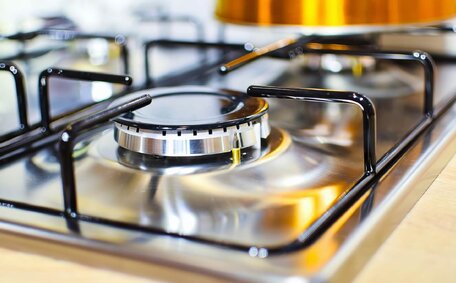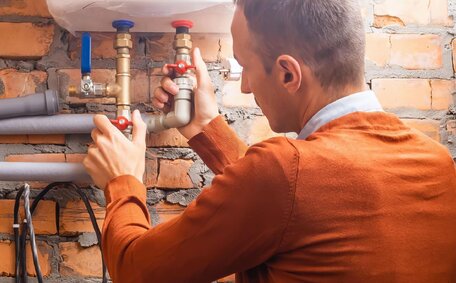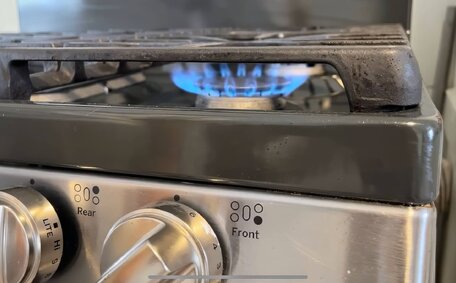Why Regular Gas Line Inspections Are Necessary
Professional gas line inspections are recommended at least once every five years, however, more frequent checks are a wise precaution especially for older systems or those susceptible to leaks. A thorough inspection and safety certification by a licenced professional helps to ensure your gas system components meet current codes and standards.
Annual inspections significantly boost gas system safety by spotting potential corrosion, damage, or loose connections that could lead to dangerous leaks. Regular gas equipment inspections are essential for preventing leaks, maintaining efficiency and ensuring safety.
Small gas leaks are a serious hazard, posing risks of fire, explosions, and poisoning from gas build-up or carbon monoxide exposure, all of which can be identified by a heating engineer. They also maintain performance; leaks and corrosion gradually degrade delivery pressure throughout your house. Additionally, periodic inspections enable timely repairs and updates to components like your water heater, preventing issue escalation.
Regular maintenance and inspections of your gas pipes can mitigate these threats.
In summary, early issue identification during gas line inspections can help prevent safety hazards. Following recommended schedules for maintaining gas lines also optimises the integrity of gas hot water systems and equipment lifespan. Protect the gas system on your property by arranging periodic checks, however, gas safety assurance is paramount.
How Often Should Gas Lines Be Inspected?
Familiarise yourself with local regulations governing inspection frequencies. In Mascot, Sydney, it’s advised to have gas safety inspections annually.
Older homes that use natural gas may encounter more problems with gas lines due to increased wear tear; natural gas line components deteriorate over decades of operation. Gas companies recommend a safety inspection of your gas lines every 2 to 3 years, especially if you use natural gas.
For homes over 10 years old, annual gas line inspections are advised. Check for corrosion, leaks, damage, and loose fittings. Focus on high-risk areas such as the gas meter, appliance connections, and gas lines. You do need to be aware that a leak as small as a pinhole can release dangerous levels of gas over time.
Stay vigilant.
While helpful, informal checks cannot replace the code compliance ensured by a professional gas safety inspection. This involves a high-pressure test to rule out delivery issues during gas inspections and thorough combustion analysis when work is carried out. Our skilled gas fitters use advanced gas leak detection tools to check your plumbing system and gas lines for issues that are not apparent to the naked eye.
Ultimately, consult a qualified gas line specialist to err on the side of caution with potential gas line problems. Arranging periodic inspections by licensed gas specialists provides peace of mind and ensures the safety of your home’s gas systems.
What To Look For During A Gas Line Inspection
Ensure you have a comprehensive gas line inspection done, examining all accessible pipes, fittings, the meter, regulator, and appliances. Key elements to check include:
- Corrosion – Look for rust, pits, cracks, or paint bubbling. This indicates pipe wall deterioration.
- Physical damage – Dents, gouges, or loose joints where a gas line should be securely fastened can cause leaks.
- Meter/regulator function – Verify that dials on your water systems operate normally and that pressure output is consistent.
- Pipe and fitting leaks – Check joints and connections using gas leak spray or by listening for hissing sounds.
- Appliance combustion – Flames should burn cleanly and evenly without yellow tipping, floating, or lifting.
While self-inspections help maintain vigilance, a professional technician can conduct thorough tests ensuring your home is gas safe, which is not possible to do at home. They conduct gas inspections with specialised equipment to identify hidden issues. A licensed inspection also provides certification of your gas supply’s compliance with safety codes.
Significant corrosion, damage, or abnormal appliance performance often requires replacement. Otherwise, being proactive with the work carried out can lead to repairs and upgrades which may suffice. Qualified experts can inspect and decide on the necessary actions to fix faults and prevent hazards.
Warning Signs of a Gas Leak
Detecting a gas leak quickly is critical. Check your surroundings for these common indicators:
- A rotten egg smell. Gas companies add a sulphur scent to alert people.
- Hissing, whistling, or roaring sounds coming from appliances or pipes.
- Dirt blowing from a hole or crack in the ground.
- Dead vegetation in one area of the lawn or garden.
- Bubbling in standing water over gas lines.
- Unexplained mould or soot buildup around appliances.
- Flames burning incorrectly, floating, or lifting on appliances.
If you suspect a leak, evacuate immediately and contact gas specialists for emergency services. Do not overlook any signs of a potential gas leak in your home, business, or any other property.
Conducting Basic Self-Inspections of Gas Lines
You can use your own judgement to conduct basic self-inspections of your household’s accessible gas lines for common signs of leaks or other issues. This involves taking the initiative to schedule your visual check of all pipes, fittings, the gas metre, appliances, and ventilation. Watch for:
- A rotten egg smell indicating a gas leak
- Damage like dents, cracks, or loose fittings
- Corrosion or rust on pipes
- Flames burning incorrectly on appliances
- Increased gas bills
It’s crucial to listen for any hissing sounds that could indicate gas escaping from pipes or appliances. Examine areas around installed gas equipment and places where pipes traverse walls, floors, and ceilings, when accessible.
Self-checks are valuable but identifying hidden leaks often demands the specialised equipment that only a certified gas inspector possesses. If you can smell gas or discover damage, rust, immediately evacuate and contact professionals for gas line repair or emergency services.
When To Call A Professional For Inspection/Repairs
It’s critical to contact a qualified professional for gas line inspection or repairs in several situations:
- You smell any gas or suspect any signs of a leak
- An appliance makes unusual sounds, has abnormal flames, or shows performance issues
- You discover corrosion, damage, loose fittings or other problems
- It has been over 3 years since your last inspection
- You require a professional for gas installation, replacement, or major gas work done
The team at Mascot Plumbing boasts over a decade of experience in providing gas line inspection services. For a gas inspection or repairs, call us on 1300 349 338 or email [email protected]. We provide comprehensive plumbing services in Mascot, Sydney for homes and businesses addressing all gas and plumbing needs.
Act quickly when issues surface by promptly scheduling gas safety inspections. When you do your due diligence in detecting problems early, it prevents hazards and costly repairs down the road; Be proactive in servicing your gas systems and engage a plumber when required. Trust our team at Mascot Plumbing to assess your gas plumbing system and perform reliable, quality work.
Ensuring Compliance With Safety Regulations
Compliance with gas safety laws and regulations is paramount for maintaining system integrity. In Mascot, Sydney, all gas fitting work requires certification for those who use gas appliances legally. Regular inspections should be conducted meticulously to guarantee continued compliance.
Local council and state laws mandate that gas appliances and equipment adhere to strict design and installation standards, verified by compliance certificates. Gas fitters undergo extensive training and licencing to carry out certified work on new gas systems.
Failure to comply risks heavy fines from local authorities, potential litigation if hazards eventuate, and denial of home insurance claims for unapproved systems. Beyond legal mandates, inspections and certified repairs give homeowners confidence in the safety of their gas equipment.
Contact qualified specialists like our team at Mascot Plumbing to arrange thorough gas line inspections. We issue updated compliance certificates following a detailed certificate inspection, utilising advanced detection methods not available to DIY checks. Ensuring code obedience preserves safety for your family.
Proper Maintenance To Prevent Leaks and Ensure Safety
Proper maintenance techniques are crucial in preventing hazardous leaks and ensuring gas system safety. Homeowners are responsible for maintaining your lines of gas plumbing from the gas meter inlet to appliances. Follow these tips:
- Arrange professional inspections every 2 years to check for leaks, corrosion, damage or compliance issues. Address any problems immediately.
- Perform regular visual checks for damage, leaks, flames issues or strange smells around your gas meter, appliances, and piping.
- Ensure your air conditioning unit and gas meter are clear of obstructions for easy access.
- Ensure heating air vents and appliance chimneys are kept clean and unblocked.
- Consider upgrades to more modern gas heating units, including water heaters, for enhanced safety features.
- When renovating or landscaping, take care not to disturb buried gas pipes.
- Never attempt DIY repairs on gas lines or appliances. Always hire a certified plumber gas expert.
Staying vigilant through conducting inspections and maintenance to integrate safety into your gas lines dramatically reduces leak risks while ensuring optimal performance. Don’t hesitate to call our team at Mascot Plumbing on 1300 349 338 for all plumbing and gas servicing needs.
What To Expect During Professional Inspection/Repair
A licenced technician from Mascot Plumbing will carry out a comprehensive, systematic check of your system’s integrity. You can expect:
- The use of advanced detection equipment to check for leaks. This includes gas sniffers to sample air and gas pressure gauges.
- A visual inspection of all accessible pipes, appliances, vents for corrosion, damage, or loose fittings.
- Checking gas pressure and flow rates to ensure proper appliance operation.
- Examining the flame of gas appliances for abnormal shapes, sounds or carbon build up.
- Conducting a combustion test to analyse flue gases.
- Repairing minor faults like tightening fittings or replacing seals.
- Providing a full safety certification to comply with regulations.
- Recommending repairs, upgrades or replacements if faults are found.
- Advising on steps to prevent issues occurring in future.
The technician will adhere to strict safety protocols, including checking for leaks before and after working on your gas appliances. You can have confidence in their experience, efficiency and workmanship.
Making Informed Decisions About Repair Vs. Replacement
As gas systems and appliances age, homeowners eventually face decisions about repairing issues or replacing components. Consider a few different key factors when determining the best course of action:
- Safety impact - If repairs can fully resolve any risks of leaks or hazards, it’s best to proceed accordingly. However, some ageing appliances or corroded pipes may only be solved by replacement.
- Costs - Compare repair expenses to the investment of wholesale replacement. Additionally, new systems can be more energy-efficient, potentially saving on long-term energy costs.
- Lifespan - Repairs may successfully extend lifespan for a few more years. However, replacing appliances can offer maximum longevity and reduce the likelihood of future problems.
- Code compliance - Old appliances and equipment may no longer meet safety regulations when problems develop, necessitating upgrades.
Engage with qualified specialists such as Mascot Plumbing for a comprehensive assessment of your gas line system. We conduct thorough inspections using advanced diagnostics and provide transparent advice on the best solution. Whether recommending targeted repairs or full system replacements, we focus on restoring safety and performance.
Rely on our extensive plumbing expertise, spanning over three decades, to guide your decisions about gas infrastructure maintenance or upgrades. Contact Mascot Plumbing at 1300 349 338 to arrange an assessment for your residential or commercial gas needs.






